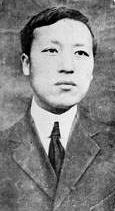Rhee Syng-man
|
|
|
| Korean spelling | |
|---|---|
| Hangeul | 이승만 |
| Hanja | 李承 晩 |
|
Revised Romanization |
I Seung-man |
|
McCune- Reischauer |
Yi Sŭngman |
Rhee Syng-man (born March 26, 1875 in Haeju , formerly Hwanghae-do Province , Korea , today Hwanghae-namdo Province , North Korea ; † July 19, 1965 in Honolulu , USA ) was a South Korean politician and dictator from 1948 to 1960 first president of South Korea.
Life
Rhee came from an impoverished aristocratic family. He attended a Methodist mission school. In his youth he participated in student protests against the monarchy in Korea and was convicted of treason. During his six-year prison sentence, he accepted the Christian faith and was a member of the Methodist Church until his death. In 1904 he went to the USA, where he received his doctorate from Princeton University in 1910 . He then temporarily returned to Korea, but had to leave the country again due to his political activities against the Japanese Empire , which annexed Korea in 1910 .
From 1912 Rhee was director of a Methodist school in Hawaii. In 1919 he was elected President of the Provisional Government of Korea in Exile in absentia . In 1920 he went to Shanghai , where the seat of the government in exile was located, but returned to Hawaii in 1925 after disputes. In 1934 he married Franziska Donner, who came from Vienna, in New York, and then lived in Washington, DC as a “representative of the Korean government in exile”.
After Japan's surrender in World War II , Korea was divided into a northern, Soviet, and a southern, US-American zone of occupation . Since the Soviet Union prevented the planned all-Korean elections, Rhee was elected on July 20, 1948 as the first President of the Republic of Korea (South Korea). He enjoyed the support of the USA, which he was considered a reliable ally in the fight against communism. His reign was marked by repression. During his reign the “ Jeju-do massacre ”, a conflict on Jejudo Island between left-wing paramilitary gangs, locals, the police and the army , triggered by various factors , in which a tenth to a quarter of the Jeju-do residents were killed.
At the beginning of his government, Rhee campaigned for a violent unification of the country. Since the protecting power USA did not support him in this policy, they refused to equip the South Korean army with heavy weapons. As a result, the Republic of (South) Korea was unable to repel the attack by the communist north in 1950. In the further course of the Korean War from 1950 to 1953, the North Korean troops were pushed back to their starting positions by the intervention of UN troops under American leadership. Rhee was opposed to the end of the war by the Eisenhower administration and advocated a continued military campaign to reunite the country. In the end, he had to submit to the wishes of the US government.

Rhees' re-elections in 1956 and 1960, presumably through manipulation, were marked by unrest in the country, against which he was ruthless. A fourth term in office was prevented in 1960 by student protests during the so-called April Revolution , after which he was flown to Hawaii with the help of the CIA .
In 1961, a South Korean court denied him and 608 of his political followers their honorary rights for seven years because of undemocratic activity. Rhee died of a heart attack in Honolulu at the age of 90.
Web links
- Rhee Syng-man Memorial (Korean)
- Biography - asiasource.org (English)
Individual evidence
- ↑ Gisela Schoeler: 63 years ago as a "riot" in prison. (PDF 2.0 MB) In: Hamburger Abendblatt, No. 95, page 11. Hamburger Abendblatt, April 23, 1960, archived from the original on December 25, 2011 ; accessed on December 1, 2015 (original website no longer available).
- ^ John Spanier: American Foreign Policy Since World War II. New York 1966, p. 108 f.
- ^ Syngman Rhee. Overthrown by friends . In: Der Spiegel . No. 19 , 1960, p. 39-40 ( online ).
- ↑ Rights revoked. In: Hamburger Abendblatt , February 27, 1961, p. 2.
| predecessor | Office | successor |
|---|---|---|
| Kim Gu |
South Korean President 1948–1960 |
Huh Jung (executive) |
| personal data | |
|---|---|
| SURNAME | Rhee, Syng-man |
| ALTERNATIVE NAMES | 이승만 (Hangeul); 李承晚 (Hanja) |
| BRIEF DESCRIPTION | South Korean President |
| DATE OF BIRTH | March 26, 1875 |
| PLACE OF BIRTH | Haeju , formerly Hwanghae-do Province, Korea, now Hwanghae-namdo Province, North Korea |
| DATE OF DEATH | July 19, 1965 |
| Place of death | Honolulu , Hawaii, United States |


